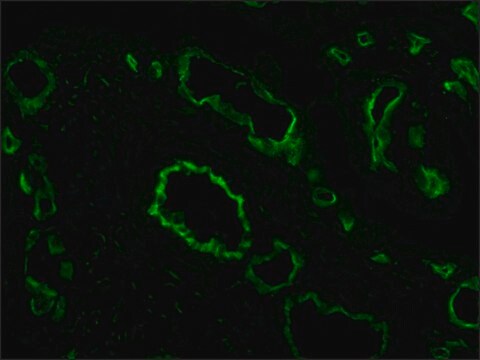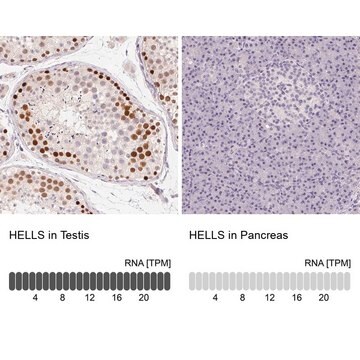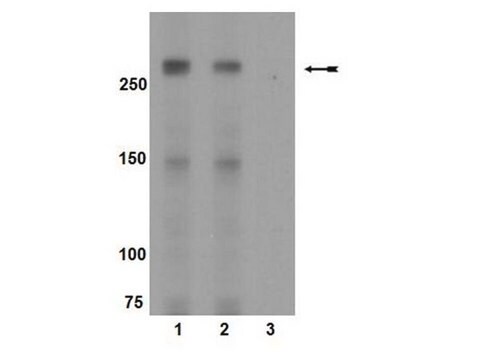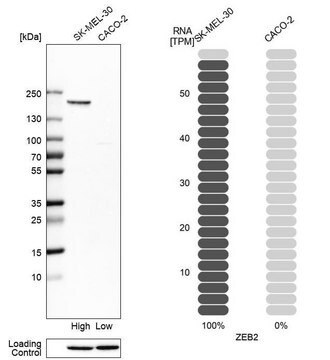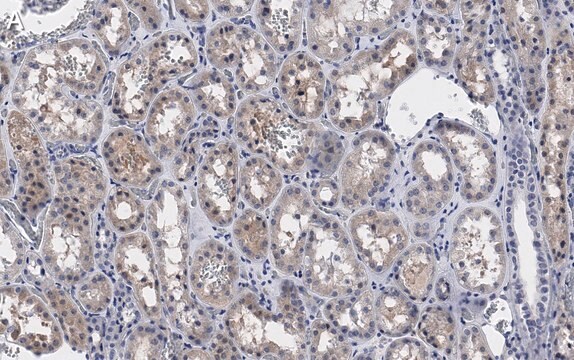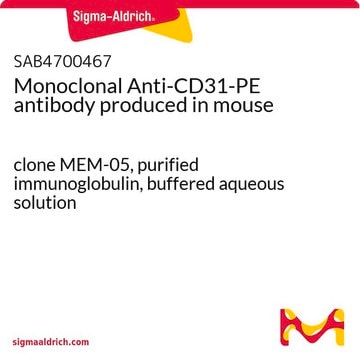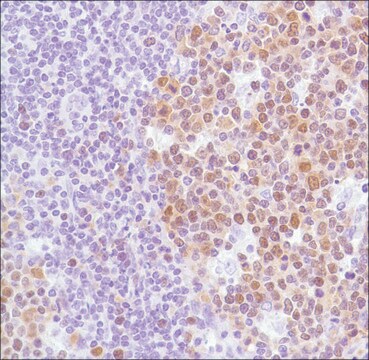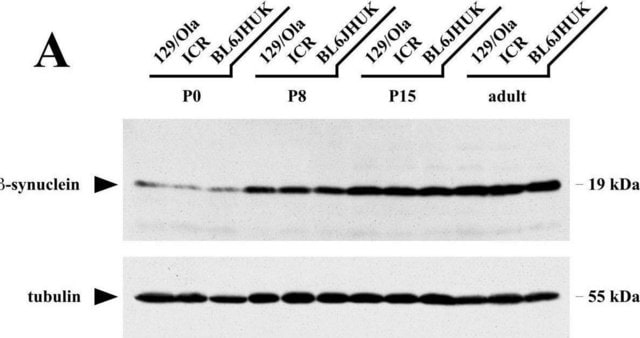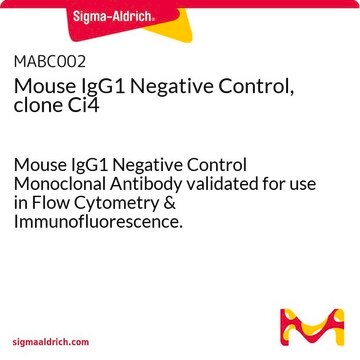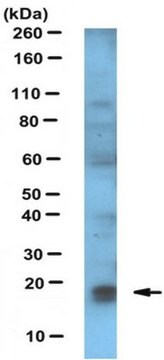SAB4200854
Anti-FAT10 antibody, Mouse monoclonal
clone FAT10-7, purified from hybridoma cell culture
Sign Into View Organizational & Contract Pricing
All Photos(2)
About This Item
UNSPSC Code:
12352203
NACRES:
NA.41
clone:
FAT10-7, monoclonal
application:
species reactivity:
human, mouse
technique(s):
immunoblotting: 4-8 μg/mL using whole lysate of human hepatocellular carcinoma HepG2 cells
citations:
6
Recommended Products
antibody form
purified from hybridoma cell culture
Quality Level
clone
FAT10-7, monoclonal
form
liquid
species reactivity
human, mouse
concentration
~1 mg/mL
technique(s)
immunoblotting: 4-8 μg/mL using whole lysate of human hepatocellular carcinoma HepG2 cells
isotype
IgG1
UniProt accession no.
shipped in
dry ice
storage temp.
−20°C
target post-translational modification
unmodified
General description
The Ubiquitin-like protein FAT10, also known as Ubiquitin D (UBD) or Human Leukocyte Antigen (HLA) -F adjacent transcript 10 (FAT10), is a member of the Ubiquitin-like proteins (UBLs) modifier proteins. There are more than 12 identified UBLs including FAT10, SUMOs, NEDD8, ISG15, UFM1, URM1, ATG12, ATG8, FUB1, and HUB1.2 In a similar manner to Ubiquitin all UBLs can be covalently attached to their target proteins via the E1–E2–E3 enzymatic cascade and share a similar structure and function. UBLylation is a major post-translational modification that in many cases leads to protein degradation in the 26S proteasome.2
Specificity
Monoclonal Anti-FAT10 antibody specifically recognizes FAT10 from human and mouse origin.
Application
The antibody may be used in various immunochemical techniques including Immunoblotting and Immunoprecipitation. Detection of the FAT10 band by Immunoblotting is specifically inhibited by the immunogen.
Biochem/physiol Actions
FAT10 is a unique UBL containing a C-terminal GG motif available for activation and conjugation. This motif differentiates FAT10 from ubiquitin and other UBLs which must be cleaved from precursor proteins. Furthermore, unlike ubiquitin that requires a poly-ubiquitin chain, the FAT10 can bind the 26S proteasome as a monomer to mediate proteasomal degradation.2-3 Under normal conditions, FAT10 has a short half-life, its expression is repressed by p534 and is restricted to tissues of the immune system like thymus, lymph nodes and the spleen. Inflammatory cytokines such as IFNγ and TNFα and downstream STAT3 and NF-κB signaling can also induce FAT10 expression in other tissues.2-3,5 FAT10 expression is also upregulated and can be increased even up to 100-fold in many cancer types including liver and colon cancer HCC, colorectal, ovarian and uterine carcinomas, triple-negative breast cancer, bladder cancer, gastric cancer, glioma, pancreatic ductal, adenocarcinoma and osteosarcoma.2,5-6
FATylation has an important role in many cellular processes varied from cell maintenance to DNA repair. Understanding FAT10 mechanism and finding its downstream substrates is important to reveal its potential role in inflammation-induced tumorigenesis.1-7
FATylation has an important role in many cellular processes varied from cell maintenance to DNA repair. Understanding FAT10 mechanism and finding its downstream substrates is important to reveal its potential role in inflammation-induced tumorigenesis.1-7
Physical form
Supplied as a solution in 0.01 M phosphate buffered saline pH 7.4, containing 15 mM sodium azide as a preservative.
Storage and Stability
For continuous use, store at 2-8°C for up to one month. For extended storage, freeze in working aliquots. Repeated freezing and thawing is not recommended. If slight turbidity occurs upon prolonged storage, clarify the solution by centrifugation before use. Working dilution samples should be discarded if not used within 12 hours.
Disclaimer
Unless otherwise stated in our catalog our products are intended for research use only and are not to be used for any other purpose, which includes but is not limited to, unauthorized commercial uses, in vitro diagnostic uses, ex vivo or in vivo therapeutic uses or any type of consumption or application to humans or animals.
Storage Class Code
12 - Non Combustible Liquids
WGK
WGK 1
Flash Point(F)
Not applicable
Flash Point(C)
Not applicable
Choose from one of the most recent versions:
Certificates of Analysis (COA)
Lot/Batch Number
Don't see the Right Version?
If you require a particular version, you can look up a specific certificate by the Lot or Batch number.
Already Own This Product?
Find documentation for the products that you have recently purchased in the Document Library.
S Lukasiak et al.
Oncogene, 27(46), 6068-6074 (2008-06-25)
The mRNA of the ubiquitin-like modifier FAT10 has been reported to be overexpressed in 90% of hepatocellular carcinoma (HCC) and in over 80% of colon, ovary and uterus carcinomas. Elevated FAT10 expression in malignancies was attributed to transcriptional upregulation upon
D W Zhang et al.
Oncogene, 25(16), 2318-2327 (2006-02-28)
FAT10 is a member of the ubiquitin-like modifier family of proteins and has been implicated to play important roles in antigen presentation, cytokine response, apoptosis and mitosis. We have recently demonstrated the upregulation of FAT10 gene expression in 90% of
Gunter Schmidtke et al.
Biochimica et biophysica acta, 1843(1), 97-102 (2013-01-22)
The Nobel prize has been awarded for the discovery of ubiquitin as a transferable signal for the degradation of proteins by the 26S proteasome. While isopeptide linkage of a protein with a single ubiquitin does not serve as a degradation
Ling Leng et al.
Journal of proteome research, 13(1), 268-276 (2013-07-19)
The ubiquitin-like protein FAT10 (HLA-F adjacent transcript 10) is uniquely expressed in mammals. The fat10 gene is encoded in the MHC class I locus in the human genome and is related to some specific processes, such as apoptosis, immune response
Annette Aichem et al.
The international journal of biochemistry & cell biology, 79, 451-461 (2016-07-10)
During the last years it has emerged that the ubiquitin-like modifier FAT10 is directly involved in cancer development. FAT10 expression is highly up-regulated by pro-inflammatory cytokines IFN-γ and TNF-α in all cell types and tissues and it was also found
Our team of scientists has experience in all areas of research including Life Science, Material Science, Chemical Synthesis, Chromatography, Analytical and many others.
Contact Technical Service